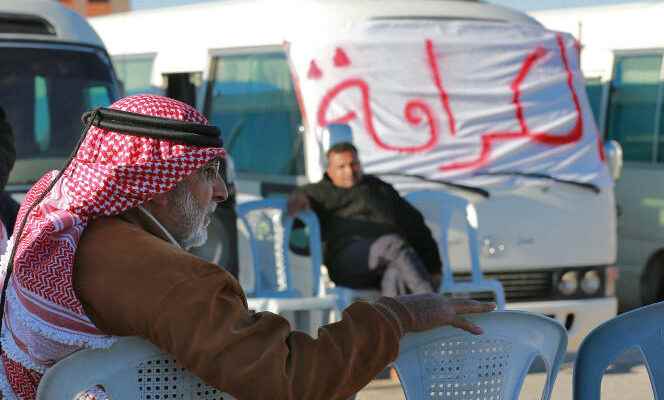Jordan is once again grappling with a spike in social anger. Dissatisfaction with the high cost of living, which is expressed regularly, has taken a violent turn, a rare occurrence in the kingdom. Military reinforcements were deployed on Friday, December 16, in the province of Maan, in the South, a region where a strike against rising fuel prices was strongly followed and where an officer was killed Thursday evening. According to authorities, Abdel-Razzaq Al-Dalabah, deputy police chief in the town of Maan, was shot in ” riots » conducted by “vandals and outlaws”. Public buildings were burned down.
In military dress, King Abdullah II offered his condolences to the relatives of the officer, buried in the Jerash region, north of Amman, where a dense crowd took part in the funeral. The monarch promised to respond with an iron fist: “We will not tolerate violence against our security personnel. » On Friday, the police made more than forty arrests.
The strike was launched in early December, first in Maan, a town more than 200 kilometers south of Amman. It is mainly due to road hauliers who consider themselves strangled by the rise in fuel prices (gasoline, diesel, kerosene, etc.), which have almost doubled compared to 2021. The increase is due to the continued lifting of subsidies and the imposition of taxes.
” Corruption
For the past two weeks, roads have been blocked. The walkout took a new turn on Wednesday when shops lowered their curtains in several cities in the poor South. The scuffles between police and demonstrators spread to other cities on Thursday evening, including north of Amman.
“Rising fuel prices are the spark of the current unrest, but the reasons for discontent have been repeated for years: poor governance, corruption, economic crisis, said Jordanian political analyst Amer Sabaileh. The government’s lack of communication made matters worse. »
Appeasement attempts had been made by the cabinet in the previous days, while the road transport strike blocked the transfer of goods arriving at the port of Aqaba and paralyzed some businesses. Monthly aid has been promised to the poorest families and a winter freeze on the price of kerosene, used for heating, has been announced. But the strikers are asking for more: lower fuel prices. Their cost weighs on family budgets. Inflation worsened with the Covid-19 pandemic and then the war in Ukraine. Poverty, which affects almost a quarter of the population, and unemployment have increased.
You have 39.53% of this article left to read. The following is for subscribers only.
